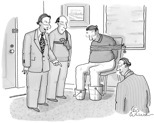Klein, Texas, is halfway between Tomball and Spring, on the coastal plain north of Houston. The land is flat. The roads run straight along the old property lines and meet at right angles, like joints in furniture. Where there are fields with cattle or horses, the trees in the distance appear as remote and aloof as a coastline. Adam Klein, a German, arrived in 1848. He had made his way to New Orleans, taken passage up the Mississippi, and gone to California to mine gold. Then he rode a horse to Panama, sailed to Galveston, and settled among Germans with names such as Klink, Klebs, Doerre, and Strack, on land that reminded them of the farms they had left behind. According to a historical marker by the graveyard in Klein, which Lyle Lovett, the singer and songwriter, drove me to in his pickup one morning and then got out of his truck to show me, nearly the oldest grave in the cemetery belongs to one of Klein’s daughters, who died of diphtheria.
Lovett lives in Klein. His mother’s people are Kleins—Adam Klein was his great-great-grandfather. Lovett’s house was built on Klein’s farm by his grandparents, in 1911. Up and down the roads that enclose the farm are houses occupied by Lovett’s relatives—each generation passed land to the next as it came of age. Bernell Klein, Lovett’s mother, was born in the house. In 1962, when Lovett was five, Bernell and her husband, William, who was from East Texas, and who died a few years ago, built a house next door. Before that, they lived an hour from Klein, in Houston, where they worked for Humble Oil. They had always intended to move to Klein and send their son to the Lutheran school.
Lovett is an only child. Each day after school, he went to his grandparents’ house until his parents came home from work. He developed a deep attachment to his grandparents and to the house, and he thought that when he was grown he would like to live in it, among their possessions. Lovett’s grandmother, who survived her husband, died in 1979, when Lovett was twenty-one. Believing that the tax bill would be too much to accommodate, the family sold the house and what remained of Adam Klein’s farm—about a hundred and sixty-five acres—to an investment group from Los Angeles, then discovered that the accounting of the bill had been wrong and they probably could have held on to the place.
The investment group put up “For Sale” signs, and while it waited for offers it leased the farm to Lovett’s uncle Calvin Klein, a cattleman, to use as pastureland. The arrangement gave Klein no incentive to care for the buildings. In 1985, Klein and Lovett persuaded the group that a good way to improve the property would be to let Lovett buy the house and its barns and remove them. Before Lovett had the house transported two hundred yards, onto land that belonged to his parents, he measured the distance from the house to the trees in the yard, so that he could plant new trees. He recorded the placement of the outbuildings. When he sits in the kitchen now, early in the morning, drinking coffee and looking out the window, as his grandmother did, he sees the same things she saw.
The house is a small, one-story frame house of a style called pier and beam, which means that it sits on blocks. It has clapboard siding and is painted white, and has a wide front porch with columns. It is surrounded by shade trees, and there is a pond in front of it. The walk through the horse barn to the back door of Lovett’s mother’s house is about a hundred yards. Among the horses in the barn are ones that Lovett and his father bought to breed and race.
The house is furnished sparely. In the parlor, the principal adornments are two saddles, each in a corner on a sawhorse. A plaque on the kitchen wall that says “Beware of Bull” commemorates an encounter Lovett and his uncle Calvin had two years ago with a bull in the pasture behind the house. They had delivered a check to a bulldozer operator who was digging a ditch. Walking back across the field, they discussed a pecan tree that had no leaves when it should have and whether it had to come out. The bull walked slowly toward them. Lovett had found the bull in the pasture as a day-old calf. The calf had followed him as he walked through the herd looking for its mother, and when no cow acknowledged it Lovett decided to raise it on a bottle. Once the bull turned two, Lovett stayed out of its way, since it was playful and was big enough to hurt someone without meaning to. Klein, who is sixty-nine, has worked with cattle all his life, so Lovett felt, as the bull approached, that if there was any reason to be worried Klein would tell him. “Usually, you throw a hat down on the ground or slap your leg,” Klein says, “and a bull will stop long enough for you to leave.”
Klein absently flipped his hand toward the bull and told it to be gone. “The next thing, my uncle did a three-sixty flip in the air,” Lovett says. “Bulls, when they’re really going at something, they’ll get down on their knees and work their head on it. He had his head on my uncle’s chest, and had torn up his shirt, and I went over and started smacking him with my cap, and he went for me.”
The bull pinned Lovett against a board fence and raked him back and forth until the fence post broke his leg. He lay on the ground and said, “Uncs, I can’t get up.” Klein and a friend from Tomball who had just arrived pulled Lovett over the fence. They laid him down in the pasture and waited for the ambulance. Klein’s arm was bleeding, and his chest was heaving—the bull had fractured several of his ribs.


























